|
|
|
Sort Order |
|
|
|
Items / Page
|
|
|
|
|
|
|
| Srl | Item |
| 1 |
ID:
120357
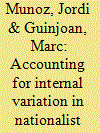

|
|
|
|
|
| Publication |
2013.
|
| Summary/Abstract |
Between September 2009 and April 2011, around one-half of the Catalan municipalities held unofficial referendums on independence from Spain, in which more than 800,000 citizens took part. However, the participation rates were unevenly distributed across Catalonia. In this paper, using an original data set, we aim to respond to two relevant questions: first, why in some municipalities the referendum took place and in others it did not occur. Second, why did the referendum achieve high rates of turnout in some localities and much lower participation in others. We find that the resources available to the movement, the intensity of the mobilization efforts, the participatory tradition of the municipalities and the size of the nationalist 'sentiment pool' in each locality explain to a great extent the internal variation in nationalist mobilization in Catalonia.
|
|
|
|
|
|
|
|
|
|
|
|
|
|
|
|
| 2 |
ID:
120360
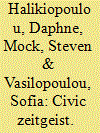

|
|
|
|
|
| Publication |
2013.
|
| Summary/Abstract |
This article examines the relationship between nationalism and liberal values and, more specifically, the redefinition of boundaries between national communities and others in the rhetoric of radical right parties in Europe. The aim is to examine the tension between radical right party discourse and the increasing need to shape this discourse in liberal terms. We argue that the radical right parties that successfully operate within the democratic system tend to be those best able to tailor their discourse to the liberal and civic characteristics of national identity so as to present themselves and their ideologies as the true authentic defenders of the nation's unique reputation for democracy, diversity and tolerance. Comparing the success of a number of European radical right parties ranging from the most electorally successful Swiss People's Party, the Dutch Pim Fortuyn List and Party for Freedom to the more mixed French Front National, British National Party and National Democratic Party of Germany we show that the parties that effectively deploy the symbolic resources of national identity through a predominantly voluntaristic prism tend to be the ones that fare better within their respective political systems. In doing so, we challenge the conventional view in the study of nationalism that expects civic values to shield countries from radicalism and extremism.
|
|
|
|
|
|
|
|
|
|
|
|
|
|
|
|
| 3 |
ID:
120358
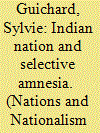

|
|
|
|
|
| Publication |
2013.
|
| Summary/Abstract |
Unity is always obtained by means of brutality' wrote Ernest Renan. Following this idea, this article investigates how social conflicts and violence are included or muted in national history. This is done by comparing the successive series of history textbooks used in India in the postindependence period. The historical narratives contained in the textbooks were influenced by different conceptions of the Indian nation, and these variations allow us to observe and better understand what is remembered or forgotten in the national narrative. We will see that conflicts and violence are referred to when they involve the nation against its 'other' but depictions of conflicts within the nation as it is imagined are avoided. Thus, certain violent episodes of the past find a place in the national historical narrative, yet violence in itself is never described.
|
|
|
|
|
|
|
|
|
|
|
|
|
|
|
|
| 4 |
ID:
120359
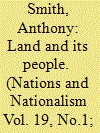

|
|
|
|
|
| Publication |
2013.
|
| Summary/Abstract |
From the late eighteenth century onwards, increasing numbers of visual artists came to identify with their nations and with the homeland and its people. This development was strongly influenced by growing national cultural support and regulation of the arts by academies, art schools, museums and art markets in Western Europe. On a subjective level, the Rousseauan movement of a 'return to Nature', Herder's espousal of vernacular cultural self-expression and, above all, the widespread Romantic cult of authenticity, were potent influences on the inner self-identification of visual artists after 1800, and were manifested in the novel importance accorded to landscape and rural genre painting in Western Europe. Here I consider the role of national sentiment, the 'return to Nature' and the cult of authenticity, first in landscape paintings by Paul Sandby, J. M. W. Turner and John Constable in early nineteenth-century Britain, and then in the rural genre paintings of Jean-Francois Millet and Jules Breton in nineteenth-century France and Josef Israels, Anton Mauve and Vincent Van Gogh in the later nineteenth-century Netherlands. Their work reveals how nineteenth-century visual artists became inwardly identified with the 'land and its people', and how they in turn contributed, especially through prints and engravings, to the dissemination of national imagery and a cultural nationalism.
|
|
|
|
|
|
|
|
|
|
|
|
|
|
|
|
| 5 |
ID:
120355


|
|
|
|
|
| Publication |
2013.
|
| Summary/Abstract |
Language and religion are arguably the two most socially and politically consequential domains of cultural difference in the modern world. Yet there have been very few efforts to compare the two in any sustained way. I begin by aligning language and religion, provisionally, with ethnicity and nationhood, and by sketching five ways in which language and religion are both similar to and similarly intertwined with ethnicity and nationhood. I then identify a series of key differences between language and religion and draw out their implications for the political accommodation of cultural heterogeneity. I show that religious pluralism tends to be more intergenerationally robust and more deeply institutionalised than linguistic pluralism in western liberal democracies, and I argue that religious pluralism entails deeper and more divisive forms of diversity. The upshot is that religion has tended to displace language as the cutting edge of contestation over the political accommodation of cultural difference - a striking reversal of the longer-term historical process through which language had previously displaced religion as the primary focus of contention.
|
|
|
|
|
|
|
|
|
|
|
|
|
|
|
|
| 6 |
ID:
120363
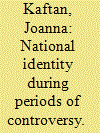

|
|
|
|
|
| Publication |
2013.
|
| Summary/Abstract |
Cinco de Mayo, celebrated by Mexican Americans as well as Americans of other ethnicities, provides an opportunity to examine the influence of ethnic festivals on broader US identity. Given the recent controversy over the immigration bill, State Bill 1070, passed in Arizona in 2010, the themes presented in newspaper articles concerning the celebration of the holiday in Phoenix, Arizona (2006-11) and the public response to these articles are examined. This examination reveals the intense contestation associated with the presentation of symbols and themes of national identity during periods of political controversy. It also illustrates that ordinary people have strong, long-standing opinions about the future of the nation and national identity and will express their opinions when an outlet is provided to them
|
|
|
|
|
|
|
|
|
|
|
|
|
|
|
|
| 7 |
ID:
120362
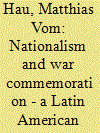

|
|
|
|
|
| Publication |
2013.
|
| Summary/Abstract |
Recent scholarship on collective memory and nationalism in Latin America argues that - in sharp contrast to Europe - war commemoration has been of little importance to the memory work of states in the region. The article challenges this claim. A comparative-historical analysis of school textbooks and school ceremonies in twentieth-century Mexico, Argentina and Peru reveals that the commemoration of major civil and international wars was central to official national narratives in these countries. The article further identifies important qualitative changes in war commemoration over time, especially with respect to how commemorative discourses portrayed agency and assigned responsibility for military victories and losses. These changes are situated within broader transformations of nationalism and new alignments in the politics of nationhood and memory.
|
|
|
|
|
|
|
|
|
|
|
|
|
|
|
|
| 8 |
ID:
120361
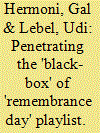

|
|
|
|
|
| Publication |
2013.
|
| Summary/Abstract |
This article examines the musical repertoire broadcast on Israeli state radio stations on Remembrance Day. Commencing with the first Remembrance Day, Israeli radio stations have refrained from broadcasting songs that do not contribute to the glorification of the military mythology or failure to reinforce the consensual perception of national loss. In view of globalization - it might be assumed that Remembrance Day songs would undergo changes in tune with the times. From a musical point of view, new songs that belong to what Regev and Seroussi classify as 'globalizing Israel' penetrated into the nationalist arena. But, following Inglehart and Baker, these songs, despite their seemingly secular façade, remain limited hegemonic enclosures organized around the core of founding values. Apparently, this is an example of the process of glocalization of culture. The article seeks answers to the strategies employed to accommodate these new songs to the traditional ideology of the classical Remembrance Day songs and examines whether the mechanisms of legitimacy that enable the inclusion of new voices on Remembrance Day, can be identified. We argue that their choice is not arbitrary and that they illustrate the manner by which voluntary cultural entrepreneurs (musical editors) are co-opted in the postnational condition.
|
|
|
|
|
|
|
|
|
|
|
|
|
|
|
|
| 9 |
ID:
120356
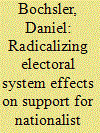

|
|
|
|
|
| Publication |
2013.
|
| Summary/Abstract |
This paper investigates electoral outcomes produced by the two-round majority system in ethnically divided societies. Earlier studies, focused mainly on the Southern American states, have revealed that in ethnically mixed environments, competitors with radical positions on ethnic issues perform particularly well. This paper extends this idea to municipal elections in Serbia, showing how radical majority nationalist parties exhibit particularly strong performances in ethnically mixed municipalities. While this effect is also apparent under proportional representation, we argue that it is much stronger when a two-round majority vote system is employed.
|
|
|
|
|
|
|
|
|
|
|
|
|
|
|
|
|
|
|
|
|